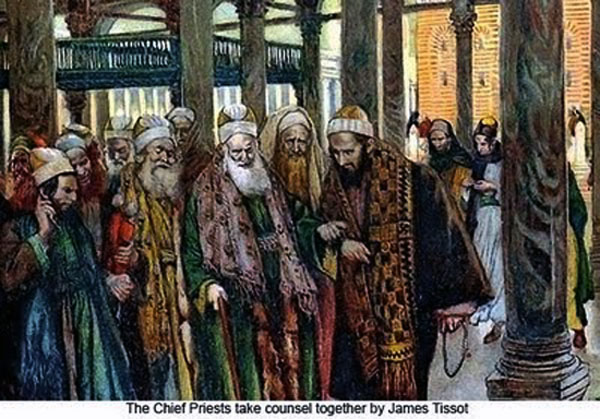Saint John 11,45-56; March 27, 2021.
How to be or become follower of Jesus Christ in the world and in our own situationThe mistake made by the High Priest Caiaphas is identical to that of all those who followed Jesus and His preaching at that time, including the Apostles before the day of Pentecost.

Strangely instead Pilate, who followed Jesus' preaching and actions also by his wife Claudia, who was probably one of the "pious women", and who later became a Christian, had understood very well who he was:
Matthew 27,22-23.26; Pilate said to them, "What shall I do then with Jesus who is called the Christ?" All answered him: "Let him be crucified!". And he added: "But what harm has he done?".
and more:
24 And Pilate, seeing that he could do nothing, but that a tumult was rising, took water and washed his hands in the presence of the multitude, saying: I am innocent of the blood of this righteous one; you think about it.
25 And all the people answering said, His blood be upon us and upon our children.
This passage from the Gospel leads me to wonder if I too I have understood who Jesus was, and to beware of clericalism.
Therefore I will not take advantage of my membership or my position in the Church to privilege my business, and I will understand that between personal ethics and political ethics - which also have the same source - there must necessarily be a difference.
Hope I will understand this well too if I read a passage from the Gospel every day and seek inspiration to think how I must act to be a follower of Christ in whatever situation I find myself.
And I hope that many politicians, or even priests and religious who say they are Christians have understood this. Let's pray God for this.
End of the comment
By clicking this link you can read a historical note about Pilate and Palestine at the time of Jesus, and why and when the Jews themselves called the Romans of Pompey the Great, to be freed by their kings who slaughtered them.
You will also know that Julius Caesar when he was besieged by the Egyptians in Alexandria he had been saved by an army of Jews and that for this he had granted them special privileges.
Let's get rid of all prejudices and try to understand why the Jews - apart from their fanaticism,incomprehensible to the Romans - did barely tolerate having to pay taxes to the Empire that protected them from invasions and built public works and infrastructures, making trade free all over the known world.
"May the force be with you." (Starwars).
So great is the memory of the time when Israel was destroyed by the emperor Titus in 70 AD that even today, in certain beautiful sci-fi films, Jewish directors and authors identify the Empire as the absolute evil and the free republic as the only good.
And in the battles against the imperial troops - the republic that is the good ones - in the end they always win, but there are always many more imperials to kill
and the Empire never altogether ceases to exist
Holy Gospel of Jesus Christ according to Saint John 11,45-56
45 Many of the Jews who had come to Mary and seen what Jesus had done began to believe in him.
46 But some of them went to the Pharisees and told them what Jesus had done.
47 So the chief priests and the Pharisees convened the Sanhedrin and said, "What are we going to do? This man is performing many signs.
48 If we leave him alone, all will believe in him, and the Romans will come and take away both our land and our nation."
49 But one of them, Caiaphas, who was high priest that year, said to them, "You know nothing,
50 nor do you consider that it is better for you that one man should die instead of the people, so that the whole nation may not perish."
51 He did not say this on his own, but since he was high priest for that year, he prophesied that Jesus was going to die for the nation,
52 and not only for the nation, but also to gather into one the dispersed children of God. 53So from that day on they planned to kill him.
54 So Jesus no longer walked about in public among the Jews, but he left for the region near the desert, to a town called Ephraim, and there he remained with his disciples.
55 Now the Passover of the Jews was near, and many went up from the country to Jerusalem before Passover to purify themselves.
56 They looked for Jesus and said to one another as they were in the temple area, "What do you think? That he will not come to the feast?"
